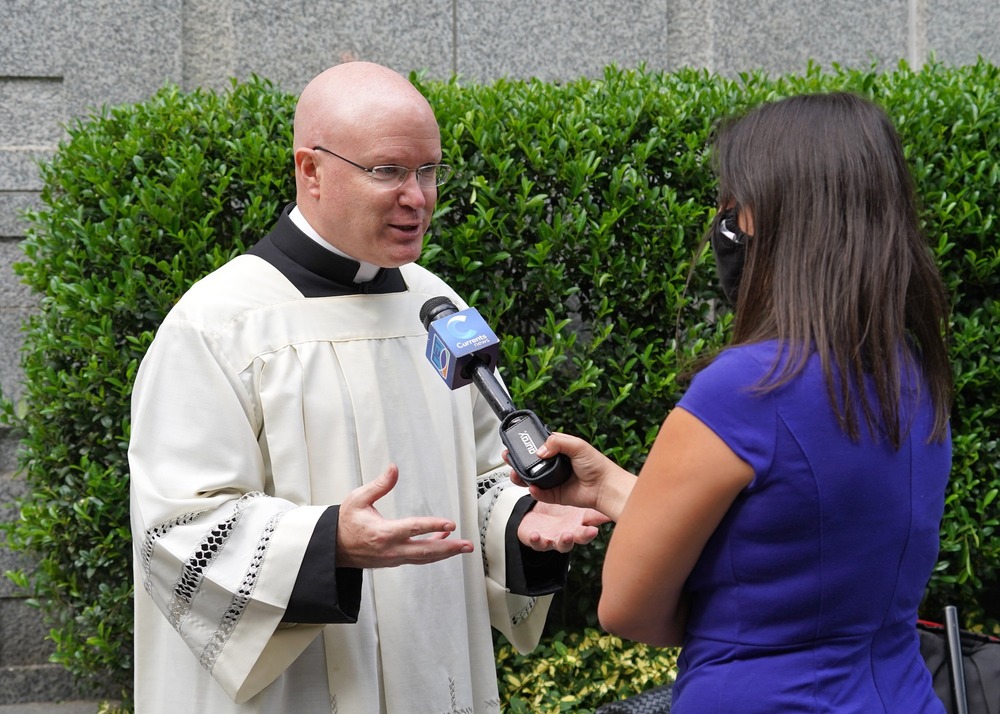
Father Roger Landry speaks with reporter Emily Drooby of NET TV, of the Diocese of Brooklyn, N.Y., prior to a prayer service for U.N. diplomats Sept. 14, 2020, at Holy Family Church in New York City. The Pontifical Mission Societies USA announced Sept. 5, 2024, that Father Landry has been named its new national director, effective in January. (OSV News/Gregory A. Shemitz, CNS Archive)
A priest who recently spent 65 days on the road with the Blessed Sacrament during a national Eucharistic pilgrimage has been tapped to head the papal missions in the U.S. — and he told OSV News he's ready to help missionaries near and far "bring God to the ends of the earth" through the Eucharist.
On Sept. 5, the Pontifical Mission Societies USA announced that Father Roger J. Landry has been named as its new national director, effective in January.
A priest of the Diocese of Fall River, Massachusetts, Landry is currently the Catholic chaplain at Columbia University, a papal Missionary of Mercy and one of the key organizers of — as well as a participant in — the 65-day National Eucharistic Pilgrimage that preceded the 10th National Eucharistic Congress in July.
Cardinal Luis Antonio Tagle, the pro-prefect of the Vatican's Dicastery for Evangelization, formally approved Landry's appointment, which had been endorsed by the societies' board of directors, led by Cardinal Timothy M. Dolan of New York.
"The Board of Directors is thrilled to welcome Father Roger J. Landry as the new National Director of The Pontifical Mission Societies," Dolan said in a Sept. 5 statement.
"His commitment to the mission of the Church and his extensive experience make him the ideal leader to guide TPMS USA in its efforts to support the global mission of evangelization, particularly where the message of the Gospel has only recently been introduced, where the Church is materially poor and cannot sustain itself, and also where our brothers in the faith are persecuted," the cardinal added.
The societies' worldwide network, which operates at the service of the pope, consists of four mission societies designated as pontifical by Pope Pius XI in 1922.
The Society of the Propagation of the Faith supports the evangelization efforts of the local church; the Missionary Childhood Association educates children about their role in the church's missionary outreach; the Society of St. Peter the Apostle trains the next generation of missionary clergy and consecrated religious; and the Missionary Union of priests and religious focuses on forming clergy, religious and pastoral leaders more deeply in their role as evangelizers.
In most countries the national director of the Pontifical Mission Societies oversees all four of the societies in that country, as well as the annual World Missions Sunday collection, taken up on the third Sunday of October in every parish across the globe.
Advertisement
While the Pontifical Mission Societies provide humanitarian relief, the network's primary focus is on evangelization, especially in areas where the Catholic Church is newly established, lacks resources or faces persecution — and the Eucharist is inherently missionary, said Landry.
"When Jesus sent out his first followers, the apostles and the disciples, to announce the Gospel to every nation, he wasn't just sending them out with a message," said Landry. "He was ultimately sending them out with the sacraments. He was equipping them to bring not just the words of God, but the Word of God made flesh itself in the holy Eucharist."
Landry said that the Pontifical Mission Societies work to foster a "missionary spirituality" and assist missionaries "on the front lines to allow them to bring God to the ends of the earth.
"And that's our great mission: to be able to bring God himself to all those people across the planet whom he has redeemed," said Landry.
The church's work "is always going to be Eucharistic work, bringing Jesus first himself, and allowing people to encounter him and enter into a relationship with him," Landry told OSV News.
In that task, missionaries reflect Christ's total gift of himself in love, the priest noted.
"(They) live a commentary on the words of consecration (at Mass) in which we say to others, 'This is my body. This is my blood. This is my time; these are my talents given by God. This is all I am and have given out of love for you, so that you might come to know and serve and love the same God who has inspired me to bring him to you,'" Landry said.
Yet that effort is not without risk, he added.
"When Jesus sent out the 12 (apostles) and then the 72 (disciples), he said something curious: 'Those who receive you receive me and those who receive me receive the One who sent me,'" Landry said. "He prepared them for those who would reject the missionaries and thereby reject him. So the proclamation of the Gospel from the beginning involved that great mystery of reception and rejection."
When missionaries are received, "That is where the real enfleshment of the Gospel takes place," said Landry. "And so it's no surprise that every missionary receives so much from those who welcome him or her in Jesus' name, because that's where Jesus is present in their midst."
And with two young men soon to be canonized — Blessed Carlo Acutis and Blessed Pier Giorgio Frassati — youth will hopefully be inspired to embrace their roles as missionaries of the Gospel, Landry said.
Both Acutis and Frassati had "clear missionary hearts and wanted to share the gift of the Catholic faith with as many people as possible," he said, adding that the pending canonizations stand to "spawn renewed emphasis on how young children, by their prayers and by their tangible sacrifices, can recognize the difference they can make (in) supporting those on the (missionary) front lines across the globe."






